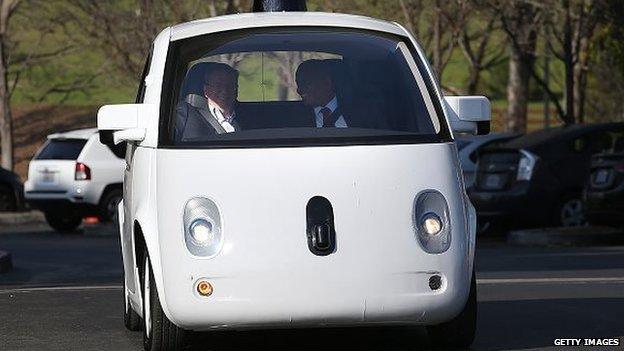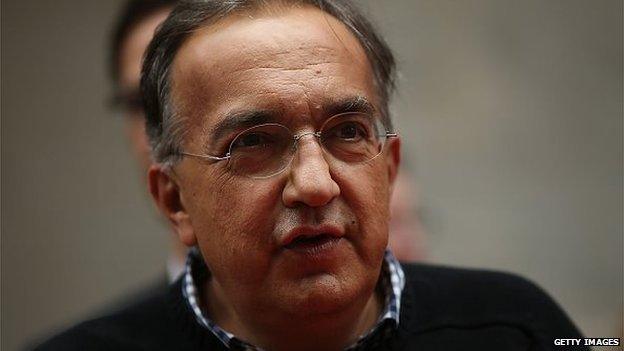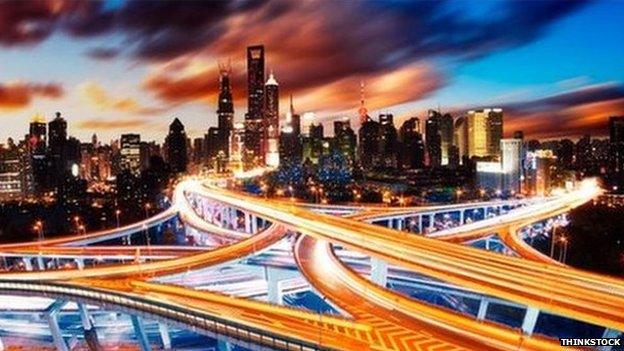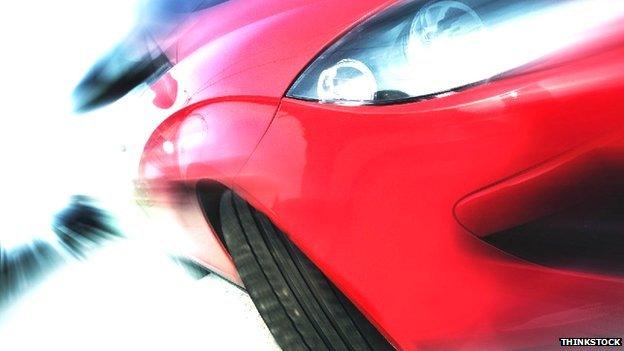Carmakers face challenge from Google and Apple
- Published

Google chair Eric Schmidt rode with US transport secretary Anthony Foxx in a Google driverless car earlier in February
Fiat-Chrysler boss Sergio Marchionne calls them the "disruptive interlopers".
Tech giants Google and Apple are moving in on the car industry, and at the Geneva Motor Show a lot of the talk is about how to embrace these newcomers, not fight them.
Google and Apple are working on driverless technology and electric vehicles, combining, said Volkswagen chief executive Martin Winterkorn, the "digital world with the mobile world".
Other companies might be dismissed as ambitious also-rans. But Google and Apple have huge financial resources - and a track record of success.
It's very early days for both companies, but the motor industry would be foolish to ignore the tech firms, said Mr Marchionne.
"They are incredibly serious. What's more, I think their interest is exactly what this industry needed. We needed a disruptive interloper to shake things up," he said.
That said, he remains "very concerned about someone of that calibre" arriving on the competition scene.

Disruptive technologies are a mixed blessing, Sergio Marchionne says
"When you're the guy whose life is being disrupted, it's not necessarily a good feeling. We might all feel better after the event. But while we're going through the event, no."
'Win-win'
Apple has several hundred people working on its electric car project, called Titan, and expects to start production within the next five to 10 years. Google's self-driving cars could be on the road within five years, the company has indicated.
Mr Marchionne said he's keen to work with either company, although there are no talks.
And Didier Leroy, Toyota's European head, said carmakers - or at least some of them - will eventually have to work with Google and Apple because of the technology they have. "It's a real win-win," he said.
But there's concern that carmakers are not yet ready to team up with the likes of Google or Apple. On one side is a struggling industry only now seeing signs that it is emerging from six years of recession.
On the other side is a nimble, well-resourced sector at the cutting edge of technology.
"The traditional thinking in the automotive industry isn't suited to exploit the opportunities in the internet community," Wolfgang Ziebart, Jaguar Land Rover's engineering head told Bloomberg at the Geneva show.
"If you need committees, and so on, to make decisions, then you've lost before you started," he said.

Are carmakers and technology firms ready to team up?
'Don't reinvent the wheel'
But Mr Marchionne said no one should think that traditional carmakers will run up the white flag in the face of the threat from Silicon Valley.
"Don't underestimate carmakers' ability to respond and adapt to new competitive challenges," he said.
Nor should people "over-blow" the alternative technologies being proposed by Google or Apple. "There's still a lot of life left in the combustion engine," Mr Marchionne said.
Carmakers have made great strides in reducing emissions, and will continue to do so. "There are more technical solutions available to comply with emissions targets. You just don't have to reinvent the wheel to get it done.
Fiat has its own hybrid cars coming to market, and he expects that by 2020 the company will have a product that is "possibly even autonomous".
So Mr Marchionne can't be accused of burying his head in the sand. It's just that he feels that "combustion still has a lot more to give in terms of producing better energy consumption".
He is not surprised that some forecasters predict that driverless technology is just around the corner. "It happens every time you see a technology shift. But the whole notion is being exaggerated," Mr Marchionne said.
"I remember when people first discussed the internet. Companies were asked why they didn't have an internet strategy, just because it was the new thing. We need to be very careful that we do not get swept away in this [latest technology shift]."

"There's life in the combustion engine," says Mr Marchionne
Regulatory challenge
Anyone who thinks driverless technology is ready to move into top gear any time soon seriously "under-estimates the impact of regulation on the way we function", he said.
Resolving issues of safety, insurance and consumer acceptance are a long way off.
"There is now, especially in the US, a much stronger interface between the car industry and regulators. That has to be taken into account by anyone who thinks there is going to be a paradigm shift [in technology].
"Paradigm shifts require an agreement with a variety of people around the table. And that's what is going to slow down the technology, even when it becomes available.
"I think [regulators] will make it much more difficult to roll a lot of the technology," he said.
"Automation" is the way forward, he feels. But "autonomous"? Now that will be a lot more difficult to achieve than people think.